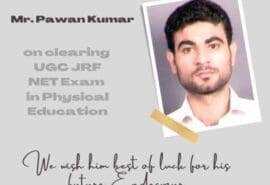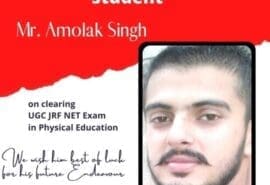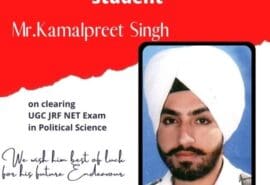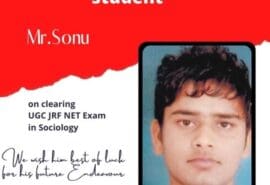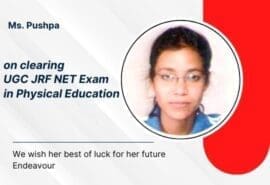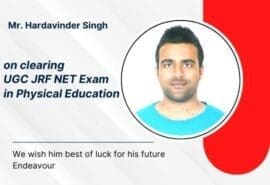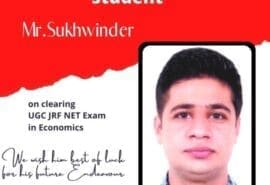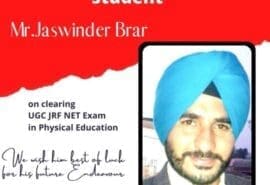
Ace the JRF Sociology Test - Our Proven Training Method
Ace the JRF Sociology Test - Our Proven Training Method
The Junior Research Fellowship (JRF) in Sociology is one of the most prestigious and competitive exams that sociology graduates aspire to crack in India. Offered by the University Grants Commission, it provides an attractive fellowship and opens doors for an academic career in sociology.
However, breaking the JRF Sociology is no cakewalk, considering the vast syllabus, analytical nature of the exam and intense competition.
Acing such a tough exam requires smart preparation strategies and robust training methods. This article provides insider tips from JRF toppers and sociology experts. It outlines a proven step-by-step training regimen to help aspirants optimize their prep and ace the JRF Sociology test.
Analyze the Exam Pattern and Syllabus
The first step to strategize your JRF Sociology preparation is analyzing the exam pattern and detailed syllabus. The JRF Sociology paper comprises two sections:
Research Methodology: This section tests your conceptual grasp and practical application of various quantitative and qualitative research methods used in sociological studies. It carries a weightage of 30%.
Subject Specific Knowledge: This comprises the sociological theory and concepts from Paper I syllabus subjects like Sociological Thought, Sociology of India, Sociological Concepts and Superstructure. It has a weightage of 70%.
Understanding the weightage of topics and the type of questions that will be asked from each section and sub-topic will help you prioritize key areas in your study plan.
For UGC JRF NET Sociology Exam Preparation Coaching, contact us at Mantram Study Group, SCO No. 80-81, First Floor, Sector 15-D, Chandigarh (Near Gate No. 2, Panjab University Chandigarh – Contact – 9779797575/ 9463049859)
Chalk Out Your Preparation Schedule
Once you are thorough with the exam structure, chalk out a preparation schedule that aligns with your test date. Ideally, 8-12 months of smart preparation is advisable for JRF Sociology.
Divide these months between building your core sociology concepts from textbooks and previous years' papers, honing your methodology skills with practice tests and improving speed and accuracy.
Ensure your schedule has balanced time for self-study with classes for doubt resolution. You can also opt for weekend crash courses on specific topics like research methods for quick concept revision close to the exam.
Follow a Test-centric Preparation
One proven training methodology for JRF Sociology suggested by most toppers is to follow a test-centric prep schedule. Treat tests not just as assessment tools but also as critical learning mechanisms. Solve topic-wise tests right after completing a concept to evaluate your grasp. Subsequently, take full-syllabus mocks regularly to train for the real-exam pressure and improve speed and accuracy.
Rigorously review all test performance to identify knowledge and skill gaps for improvement. Keep revising concepts you find difficult or often get wrong in mock tests. Use mocks for time management training to ensure you can confidently attempt the 150-question paper in 180 minutes.
Master Key Subjects and Topics
While the entire syllabus requires thorough preparation, sociology experts and previous years' trends highlight some key subjects and topics that need additional focus:
Research Methods: Probability sampling techniques, scales of measurements, interview and observation methods, content analysis, variables, hypothesis testing, correlation vs causation and result interpretation
Sociological Thought: Pioneering theories of Karl Marx, Emile Durkheim and Max Weber
Sociology of India: Works of G.S Ghurye, M.N Srinivas, Louis Dumont on features like caste, tribe, family and marriage
Concepts: Social structure, function, social system and institutions, culture, power, authority vs coercion, social control, deviance, etc.
To ace the exam, strengthen these core areas through rigorous revision, concept application and mock test drills.
Practice Answer Writing
The JRF Sociology paper is designed to test sociological concepts and evaluate analytical skills, critical thinking ability and coherence of idea expression. Hence, practicing long-form writing as per the required word limit is integral.
Attempt previous ten years' papers and sample papers within the specified time to train for writing concise answers with the right structure, keywords and concepts covering all aspects the question demands. Identify gaps in structure, expression or sociological arguments through self-review and mentors to sharpen writing skills.
Stay Motivated with a Peer Group
The marathon-like nature of JRF preparations and the vast syllabus scope can sometimes lead to burnout, distraction or waning motivation. One way to overcome this is by studying with a motivated peer group or joining online communities of co-aspirants.
Having a learning-focused peer group for discussion keeps you engaged. Peer collaboration for tests, motivation by seeing others work hard and even healthy competition help sustain the prep momentum and determination essential for JRF success.
Conclusion
Cracking the JRF Sociology requires meticulous exam-oriented preparations, perseverance, and adopting the proven training methodologies outlined above.
Following this smart step-by-step regimen from start to end - analyzing concepts from tests, honing analytical skills through writing practice and sustaining motivation via peer collaboration - you will optimize your prep to ace the JRF Sociology test. Consistent efforts using these methods can help aspirants realize the coveted JRF fellowship.
Thanks for visiting our website Mantram Study Group
CHECK OUR OTHER LINKS: -
Testimonials
 Their passion for teaching and extensive knowledge of the subject matter shines through in their engaging lectures and interactive class sessions. Students can grasp complex concepts and excel in their exams with their guidance. The CSIR Life Science Coaching Academy's commitment to students' success is evident in its teaching methodology.
Their passion for teaching and extensive knowledge of the subject matter shines through in their engaging lectures and interactive class sessions. Students can grasp complex concepts and excel in their exams with their guidance. The CSIR Life Science Coaching Academy's commitment to students' success is evident in its teaching methodology.
















